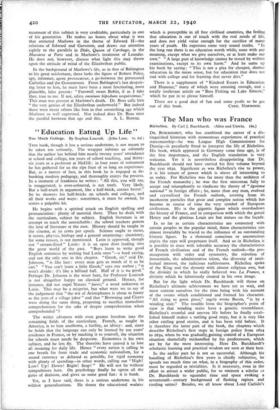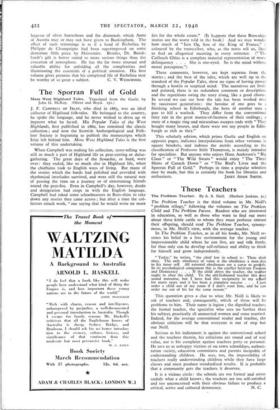The Man who was France
Richelieu. By Carl J. Burckhardt. (Allen and Unwin. 16s.) DR. BURCXHARDT, who has combined the career of a dis- tinguished historian with momentous experiences of practical statesmanship—he was League High Commissioner for Danzig—is peculiarly fitted to interpret the life of Richelieu. His book, which appeared in Germany some time ago, is of the first importance, and the English translation is very welcome. Yet it is nevertheless disappointing that Dr. Burckhardt should not have carried his first volume beyond the year 1630. Significant as was Richelieu's rise to power, it is his tenure of power which is above all interesting to us today. For Richelieu was far more than the architect of the French monarchy ; he was the first statesman fully to accept and triumphantly to vindicate the theory of " egoism,: national" in foreign affairs ; he, more than any man, evolved and crystallised the French outlook, creating from its incoherent particles that great and complex nation which has become in course of time the very symbol of European civilisation. His is the gigantic figure which overshadows the history of France, and in comparison with which the genial Henry and the glorious Louis are but statues on the façade.
In so far as certain characteristics are connected with certain peoples in the popular mind, those characteristics can almost invariably be traced to the influence of an outstanding historic figure. In a thousand conscious or unconscious copies the type will perpetuate itself. And so in Richelieu it is possible to trace with tolerable accuracy the characteristics of French civilisation and of the French outlook—the pre- occupation with order and symmetry, the rejection of inessentials, the administrative talent, the diversity of intel- lectual interest, the judicious ruthlessness. Richelieu spoke of the King and the dynasty with almost religious awe, but the divinity in which he really believed was La France, a divinity which he laboriously created in his own image.
But for the light which Dr. Burckhardt will throw on Richelieu's ultimate achievement we have yet to wait, and must content ourselves for the time being with his account of the events which conditioned and formed his character. " All rising to great place," sagely wrote Bacon, " is by a winding stair." The trouble from the" biographer's point of view is that winding stairs have a generic resemblance. Richelieu's eventful and uneven life before he finally estab- lished himself makes a rattling good story, but it is very like other rattling good stories, and it has been told before. It is therefore the latter part of the book, the chapters which describe Richelieu's first steps in foreign policy from 1624 to 1630, when he was gradually aining control of a European situation shamefully mishandled by his predecessors, which are by far the most interesting. Here Dr. Burckhardt's scholastic learning and practical wisdom are seen at their best.
In the earlier part he is not so successful. Although his handling of Richelieu's first years is chiefly subjective, he spends too much time on what, in a biography of this order, must be regarded as trivialities. Is it necessary, even in the effort to attract a wider public, for so eminent a scholar ps Dr. Burckhardt to squander time and space evoking a seventeenth - century background of flashing rapiers and rustling satins? Besides, we all know about Lord Carlisle's
largesse of silver horseshoes and the diamonds which Anne of Austria may or may not have given to Buckingham. The effect of such trimmings is as if a head of Richelieu by Philippe de Champaigne had been superimposed on some dexterous little piece by Meissonier. Besides, Dr. Burck- hardt's gift is better suited to more serious things than the evocation of atmosphere. He has the far more unusual and valuable ability for unfolding all the complexities and illuminating the essentials of a political situation. His first volume gives promise that his completed life of Richelieu may be worthy of so great a subject. C. V. WEDGWOOD.







































 Previous page
Previous page